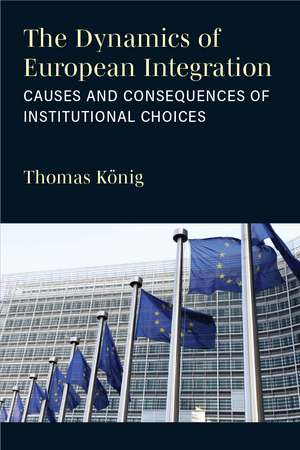The Dynamics of European Integration: Causes and Consequences of Institutional Choices
Autor Thomas Königen Limba Engleză Paperback – 2 mai 2024
| Toate formatele și edițiile | Preț | Express |
|---|---|---|
| Paperback (1) | 198.60 lei 3-5 săpt. | +10.99 lei 4-10 zile |
| UNIVERSITY OF MICHIGAN PRESS – 2 mai 2024 | 198.60 lei 3-5 săpt. | +10.99 lei 4-10 zile |
| Hardback (1) | 374.20 lei 3-5 săpt. | |
| UNIVERSITY OF MICHIGAN PRESS – 2 mai 2024 | 374.20 lei 3-5 săpt. |
Preț: 198.60 lei
Nou
Puncte Express: 298
Preț estimativ în valută:
38.01€ • 39.53$ • 31.38£
38.01€ • 39.53$ • 31.38£
Carte disponibilă
Livrare economică 24 martie-07 aprilie
Livrare express 07-13 martie pentru 20.98 lei
Preluare comenzi: 021 569.72.76
Specificații
ISBN-13: 9780472039685
ISBN-10: 0472039687
Pagini: 220
Ilustrații: 44 images, 8 tables
Dimensiuni: 152 x 229 x 18 mm
Greutate: 0.29 kg
Editura: UNIVERSITY OF MICHIGAN PRESS
Colecția University of Michigan Press
ISBN-10: 0472039687
Pagini: 220
Ilustrații: 44 images, 8 tables
Dimensiuni: 152 x 229 x 18 mm
Greutate: 0.29 kg
Editura: UNIVERSITY OF MICHIGAN PRESS
Colecția University of Michigan Press
Notă biografică
Thomas König is Professor of Political Science and European Politics at the University of Mannheim.
Cuprins
Introduction
Chapter 1 From Constraining Dissensus to Supranational Consensus?
Chapter 2 Causes of Institutional Choices for Europe
Chapter 3 Design and Competence for Europe
Chapter 4 Choices for Europe After Maastricht
Chapter 5 Consequences of Choices for Europe
Chapter 6 Phase I: Technocracism and Compliance
Chapter 7 Phase II: Partisan Conflict and Supranational Camp-building
Chapter 8 Phase III: Polarization and Identity-formation
Chapter 9 Conclusion and Outlook
References
Keyword Index
Chapter 1 From Constraining Dissensus to Supranational Consensus?
Chapter 2 Causes of Institutional Choices for Europe
Chapter 3 Design and Competence for Europe
Chapter 4 Choices for Europe After Maastricht
Chapter 5 Consequences of Choices for Europe
Chapter 6 Phase I: Technocracism and Compliance
Chapter 7 Phase II: Partisan Conflict and Supranational Camp-building
Chapter 8 Phase III: Polarization and Identity-formation
Chapter 9 Conclusion and Outlook
References
Keyword Index
Recenzii
“Thomas König’s ‘partyism’ makes a major contribution to the study of European integration. It offers a comprehensive model and rich empirical analysis of the development of the European Union since the early 1990s. This impressive synthesis is sure to shape our understanding and theorizing of European politics and governance.”
“This is a fundamental book. König focuses on the actors that operate (face constraints, receive payoffs and interact) in both national and European systems: the (supra)national parties. He derives propositions on both causes and consequences of these actors’ choices and uses large datasets to corroborate his expectations. A remarkable achievement.”
“Thomas König has set out and tested a completely new explanation of European integration, where the central actors are political parties rather than national governments or the supranational institutions. The theoretical ideas and the empirical tests are based on several decades of research and careful thinking by Thomas and his colleagues. The result is the most important book on European integration since Moravcsik’s The Choice for Europe in 1988.”
“Professor Thomas König’s book is an extremely important and a well-timed attempt to explain how the EU has changed in recent decades. Its insights provide valuable grist for the mill for scholars, practitioners, and politicians alike interested in making sense of how the EU has managed sets of crises and what it all means for the future of the European project.”
“This is a fundamental book. König focuses on the actors that operate (face constraints, receive payoffs and interact) in both national and European systems: the (supra)national parties. He derives propositions on both causes and consequences of these actors’ choices and uses large datasets to corroborate his expectations. A remarkable achievement.”
“Thomas König has set out and tested a completely new explanation of European integration, where the central actors are political parties rather than national governments or the supranational institutions. The theoretical ideas and the empirical tests are based on several decades of research and careful thinking by Thomas and his colleagues. The result is the most important book on European integration since Moravcsik’s The Choice for Europe in 1988.”
“Professor Thomas König’s book is an extremely important and a well-timed attempt to explain how the EU has changed in recent decades. Its insights provide valuable grist for the mill for scholars, practitioners, and politicians alike interested in making sense of how the EU has managed sets of crises and what it all means for the future of the European project.”
Descriere
Examines how certain policy models can work within the context of dissensus and polarization in Europe while still promoting solidarity and trust in the European Union
